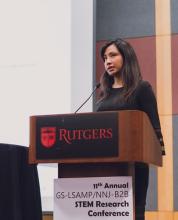
Dr. Sabrina Tsang’s Research Reinforces Cross-Protective Efficacy of the Bivalent HPV Vaccine in the Costa Rica HPV Vaccine Trial
April 27, 2020
Dr. Sabrina Tsang, a current CPFP Fellow housed in the NCI Division of Cancer Epidemiology and Genetics (DCEG), recently published a manuscript titled “Durability of Cross-Protection by Different…
Dr. Sabrina Tsang, a current CPFP Fellow housed in the NCI Division of Cancer Epidemiology and Genetics (DCEG), recently published a manuscript titled “Durability of Cross-Protection by Different Schedules of the Bivalent HPV Vaccine: the CVT Trial.” The piece was released February 24, 2020, in the Journal of the National Cancer Institute.
Persistent infection with carcinogenic human papillomavirus (HPV) is a necessary cause of cervical cancer, with HPV types 16/18 causing about 70% of all cervical cancer cases and HPV31/33/45 accounting for another 13%. The Costa Rica HPV Vaccine Trial (CVT) has previously documented cross-protection of the bivalent HPV vaccine against HPV31/33/45 up to seven years after vaccination, even with one dose of the vaccine. However, the durability of such protection remained unknown. In this study, Dr. Tsang and her collaborators evaluated the efficacy of different vaccine schedules against HPV31/33/45 out to 11 years post-vaccination, also expanding to other non-targeted HPV types.
The study determined that significant cross-protection afforded by the bivalent vaccine against HPV31/33/45 was sustained and remained stable over 11 years. Dr. Tsang emphasizes the impact of the study results: “Our findings on the durability of cross-protective efficacy of the bivalent vaccine suggest that it may protect against a greater percentage of cervical cancers than researchers had anticipated.” Read more about this study and a complementary study led by Dr. Tsang’s NCI DCEG preceptor, Dr. Aimée Kreimer, in NCI’s Cancer Currents Blog.
After identifying cross-protected HPV types, Dr. Tsang will conduct a follow-up study to evaluate vaccine efficacy at the HPV lineage level. She hopes that the genetics of HPV can help shed light on the phenomenon of cross-protection.

Dr. Peter DelNero Selected to Serve on the AACR Associate Member Council
April 15, 2020
Dr. Pete DelNero, a current CPFP Fellow, has been selected to serve on the American Association for Cancer Research’s (AACR) Associate Member Council (AMC) for a three-year term. The AMC is comprised…
Dr. Pete DelNero, a current CPFP Fellow, has been selected to serve on the American Association for Cancer Research’s (AACR) Associate Member Council (AMC) for a three-year term. The AMC is comprised of students and fellows presently training in the field of cancer research. As a council member, Dr. DelNero will work with counterparts to develop and promote AACR programs aimed at supporting early-career investigators.
After a review of applicants’ research, leadership, and extracurricular experiences, only four Associate member candidates are selected to serve on the AMC each year. Dr. DelNero will bring to the council an impressive background in biomedical engineering, a current research program in implementation science, and a strong commitment to community engagement. Equipped with these qualifications, Dr. DelNero will join peers on the AMC to act in an advisory role to the AACR on issues affecting emerging cancer researchers.
Associate members play an important role in developing the commitments and priorities that ultimately shape the research agenda. By serving on the AMC, Dr. DelNero will press goals that are most important to trainees.
Dr. DelNero says he appreciates the continuous support that he receives for professional formation, especially from CPF staff and colleagues. The AMC position allows Dr. DelNero to contribute his energy and talents to enhance the experiences of AACR’s early-career scientists.

Dr. Derek Brown Explores Biological Mechanisms Linking Somatic Loss of Y Chromosome to Cancer
April 6, 2020
Dr. Derek Brown, a current CPFP Fellow housed in the NCI Division of Cancer Epidemiology and Genetics (DCEG), recently published an editorial titled “Why Y? Downregulation of Chromosome Y Genes…
Dr. Derek Brown, a current CPFP Fellow housed in the NCI Division of Cancer Epidemiology and Genetics (DCEG), recently published an editorial titled “Why Y? Downregulation of Chromosome Y Genes Potentially Contributes to Elevated Cancer Risk.” The piece was released January 16, 2020, in the JNCI: Journal of the National Cancer Institute.
In men, somatic loss of the Y chromosome, referred to as mosaic loss of Y (LOY), has been shown to be associated with both hematological malignancies as well as solid tumors. Although observational studies have suggested a connection between LOY and cancer, little is known about the biological mechanisms which link LOY to cancer. Within the article, Dr. Brown and his DCEG preceptor and NIH Earl Stadtman Investigator, Dr. Mitchell Machiela, discuss new findings which suggest down-regulation of chromosome Y gene expression as a possible mediator between LOY and cancer risk.
Post publication, Drs. Brown and Machiela continue to investigate possible biological mechanisms which could potentially connect mosaic LOY and elevated cancer risk.

2020 William G. Coleman Jr., Minority Health and Health Disparities Research Innovation Award Recipients: Drs. Brittny Davis Lynn, Emily Rossi, and Joe Shearer
January 9, 2020
CPFP alumna Dr. Brittny Davis Lynn and current Cancer Prevention Fellows Dr. Emily Rossi and Dr. Joe Shearer are 2020 recipients of the prestigious William G. Coleman Jr., Minority Health and Health…
CPFP alumna Dr. Brittny Davis Lynn and current Cancer Prevention Fellows Dr. Emily Rossi and Dr. Joe Shearer are 2020 recipients of the prestigious William G. Coleman Jr., Minority Health and Health Disparities Research Innovation Award. The National Institute of Minority Health and Health Disparities (NIMHD) established this competitive award to support innovative research that has the potential for high impact in any area of minority health and health disparities research. Each recipient, with their respective teams, will receive a $15,000 research award to study key determinants of health inequities and advance scientific knowledge within the field.
Through her project, “The breast milk microbiome and its relationship with breast cancer risk factors among black and white women,” Dr. Davis Lynn, an Independent Research Scholar in the Division of Cancer Epidemiology and Genetics’ Integrative Tumor Epidemiology Branch, aims at extending upon previous breast milk and microbiome research to a larger population of black and white women, in order to comprehensively evaluate the associations between breast cancer risk factors and the breast milk microbiome. Additionally, risk factor and breast milk microbiome data will be integrated with other breast milk biomarkers, such as DNA methylation and cytokine levels, to examine their inter-relationships, and determine whether racial differences exist in these associations.
Dr. Emily Rossi, with NCI postdoctoral colleagues Drs. Rony Arauz Melendez and Sheryse Taylor, aim to compare lung tumor and adjacent non-tumor tissue of European American (EA) and African American (AA) patients to delineate immune cell subsets using methylation signatures. In their project, “Contribution of Genetic Ancestry to Differences in the Immune Landscape of Lung Cancer in European Americans and African Americans,” the team will also analyze tumor-infiltrating immune cell composition and neoantigen load, and how these immune factors differ by genetic ancestry. By characterizing these population-level immune-dependent differences, they hope to contribute to a more precise determination of biomarkers to inform precision medicine that adequately represents AAs.
Dr. Shearer’s project, “Evaluating the impact of concentrated animal feeding operations on Campylobacter jejuni infections in rural agricultural communities,” will utilize resources from an ongoing epidemiologic study of farming and non-farming Iowa residents with information on previous agricultural exposures (e.g., direct animal exposure) and available biospecimens, to evaluate whether residential proximity to concentrated animal feeding operations is associated with circulating C. jejuni antibody levels, among rural, agricultural residents. He also aims to examine the relationship between recent direct contact with animals and circulating C. jejuni antibody levels, in the same population.

Dr. Esmeralda Ramirez-Peña Gives Keynote Address at GSLSAMP/NNJ-B2B STEM Research Conference
December 11, 2019
Dr. Esmeralda Ramirez-Peña, a current CPFP Fellow, was invited to present the keynote address at the 11th Annual GSLSAMP/NNJ-B2B STEM Research Conference at Rutgers University. Dr. Ramirez-Peña’s…
In October 2019, Dr. Esmeralda Ramirez-Peña, a current CPFP Fellow, was invited to present the keynote address at the 11th Annual GSLSAMP/NNJ-B2B STEM Research Conference at Rutgers University. This yearly event is sponsored by the Garden State-Louis Stokes Alliance for Minority Participation and the Northern New Jersey Bridges to Baccalaureate Alliance and seeks to support traditionally underrepresented minority (URM) students by expanding opportunities in STEM-related disciplines.
Dr. Ramirez-Peña’s address focused on her scientific journey from childhood, a stage of her life impacted by a move from Mexico to the US, to the present. She told the story of her passion for laboratory research and her struggle with impostor syndrome (IS), a struggle which was amplified by statistics surrounding attrition rates and lack of leadership positions for URMs and women in STEM. She stressed that participation in community outreach initiatives helped her to realize that as a female, Latina scientist, she had the power to inspire future generations of URM researchers. From these experiences, she became more comfortable in her space as a scientist.
Esmeralda also credits the CPFP for supporting this scientific journey. She expressed that with “the NCI CPFP I have received training that has enhanced my scientific career through the M.P.H. and the Leadership Series. These training opportunities have broadened my horizons and have enabled me to make valuable connections with other URMs in public health and cancer research. The Leadership Training Series has equipped me with strategies on dealing with IS and strengthening emotional intelligence to maximize my productivity. I was able to share what I learned from this series during my talk and pass on valuable information to students struggling with IS.”
Following her talk, Dr. Ramirez-Peña interacted with conference attendees, students presenting research projects on topics spanning engineering, the microbiome, genetics, single cell algorithms, and immunology. She enjoyed learning about their own scientific experiences and the strong academic community and dedicated mentors they receive from the Garden State Louis Stokes Alliance for Minority Participation and The Northern New Jersey Bridges to Baccalaureate Alliance.